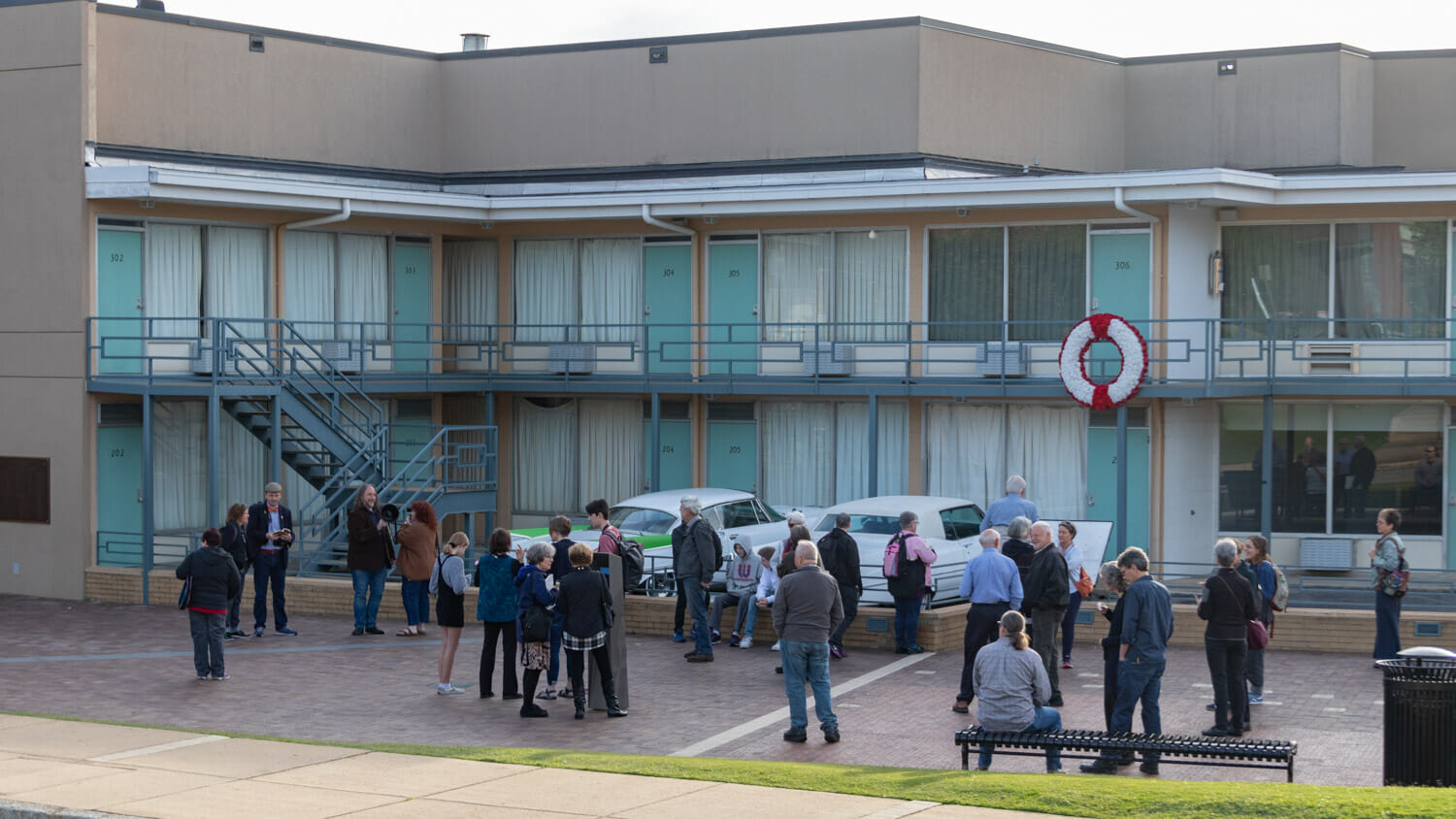
Photograph by G. Travis Norvell
Experiencing Advent early at the National Civil Rights Museum
Rev. G. Travis Norvell
December 13, 2018
In Advent we receive the gift of poetry, song, and proclamations. There are stories revealing to us for a brief moment in time a different way to live. The moment is fleeting and ephemeral and can pass us by if we are not prepared to seize it. The season implores us to stay awake.
This fall I experienced Advent early, at the National Civil Rights Museum in Memphis, Tenn.
As I finished my tour of the sacred ground overlooking the balcony of the Lorraine Hotel where the Rev. Dr. Martin Luther King, Jr. was assassinated, Ben Branch’s saxophone was playing “Precious Lord, Take My Hand” over the speakers, and I was crying. I was in Memphis along with 48 other members from Judson Memorial Baptist Church for a three-day racial justice pilgrimage. Then I saw a picture that grabbed my innards and transformed me.
The pilgrimage, organized and facilitated by two Judson members, included sessions on active listening, meditation, sharing personal stories, trips to Slave Haven and Underground Railroad Museum, The Stax Museum of American Soul, Beale Street, and the National Civil Rights Museum, conversations with the former executive director of the National Civil Rights Museum and a Harriet Tubman reenactor/storyteller. I thought the pilgrimage would be a transformational experience for the congregation. For myself I thought it would be an interesting trip. I had just come back from a transformative pilgrimage during my sabbatical in the United Kingdom, walking St. Cuthbert’s Way. I was still processing that trip.
Then I saw the picture of the late Rev. Will Campbell, a white “bootleg” Baptist preacher, standing on the balcony of the Lorraine Hotel moments after Dr. King was shot. Instantly my crying ceased and I felt my mouth go ashen. In an instant a million thoughts rushed through my soul. I heard my kids asking me, “Dad, tell me exactly what are you doing for racial justice?” I remembered, as a young man, hearing family members muttering excuses when I asked them what they did during the Civil Rights Era, and I felt a rush of fear go through my spine—the fear that everyone would know that I harbor racist thoughts.
Campbell’s life, ministry and writing revealed for me a way, as a white pastor, to be both an ally and agitator for racial justice. As the roving representative in the south for the National Council of Churches during the early Civil Rights era, editor of the journal Katallagete, and writer of historical fiction. Campbell confronted his racism, rather than let the shame and fear of confessing it keep him from the work of racial justice.
My experience of the National Civil Rights Museum held up a mirror to me and the reflection I saw was not “the fairest one of all” but a racist self that I wanted to change and transform. Luckily, I was on pilgrimage with a group of people who were also on parallel journeys.
My experience of the National Civil Rights Museum held up a mirror to me and the reflection I saw was not “the fairest one of all” but a racist self that I wanted to change and transform. Luckily, I was on pilgrimage with a group of people who were also on parallel journeys.
Our Bible studies used the texts of Advent to center throughout the pilgrimage. When we read the lessons from Isaiah we asked each other, what mountains need to be leveled? What crooked places made straight? The more I allowed these texts to find a new home in my heart, the more inner work I realized I needed to do.
I have always viewed racism through the lens of twelve-step programs: I am a recovering racist. Growing up in West Virginia, racism was part of the water as much as pollution was part of the air from Union Carbide. When I was a teenager, the church functioned as the only safe place to confront and work on my racism. Campus ministry in college furthered my path toward racial justice and divinity school functioned as daily anti-racism intensive training. Nonetheless, in my adult life, the white church has been one of the places most resistant to confessing, much less confronting racism.
The white church is quick to point the finger at racist actions, but slow to look at itself and deliver an honest assessment. I understand. No one wants to go in a public space and confess, “I am a racist.” A white body of believers doesn’t want to go on the record as being racist. I understand the amount of shame and fear laden behind such a confession. However, if the church is going to be a place of redemption, then it cannot remain cloaked in denial and fear. William Sloane Coffin once said in the gospels the opposite of love is not hate, but fear; because perfect love casts out fear.
I dream that white churches, like Judson, could, on the one hand, be places where racism is called out and confronted and, on the other hand, be places acting as twelve step programs to heal racism. Since the 49 of us returned from Memphis we have had two weekly check-ins. We are taking risks, leaning into discomfort, encouraging each other, asking questions, listening. We are seeing things never seen before in ourselves, our homes, in our city. We are changing, trying to be part of healing of this nation, rather than a part of the problem.
The Rev. G. Travis Norvell is pastor of Judson Memorial Baptist Church, Minneapolis, Minn.
The views expressed are those of the author and not necessarily those of American Baptist Home Mission Societies.
Want the latest from The Christian Citizen?
Subscribe to Christian Citizen Weekly

